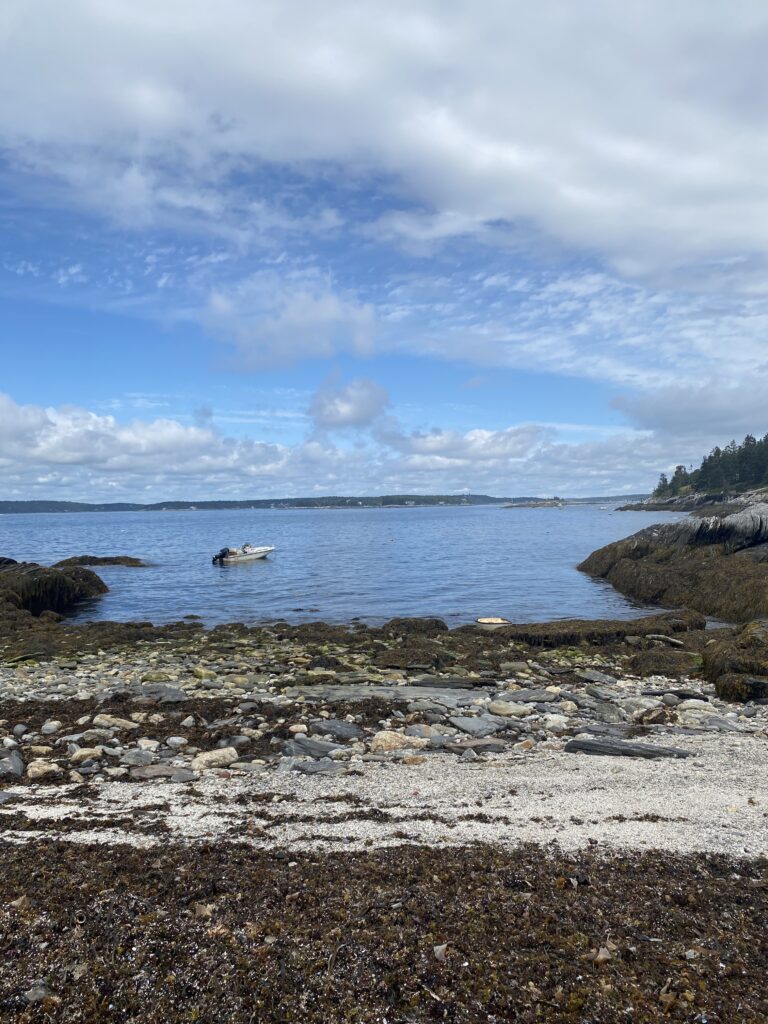The Moonrise program encourages blind students to challenge themselves through island camping.

After spending two years teaching English to students at a university in Saudi Arabia, Ethan Sewall returned to the United States during the height of the coronavirus pandemic.
Sewall earned a bachelor’s in Ancient Greek from Yale University. He then went on to receive a master’s in human development and psychology at the Harvard Graduate School of Education, a master’s in applied linguistics at UMass Boston and a PhD in applied linguistics at the University of Maryland. He spent several years teaching ESL in numerous countries around the world.
Shortly after his return from Saudi Arabia, the Boston Native had brief teaching stints at a couple of public schools before noticing an ad for an ESL teaching position at Perkins School for the Blind. It was a new position for the school, and Sewall was offered the job in July 2022. Even though he had never taught special education, his ESL background and administrative experience made him an ideal fit.
“It’s been a really good match,” said Sewall, whose official title is English Language Development Teacher and Coordinator. “In the past year, I’ve really enjoyed it. I love working with all of my students.”
Halfway through the 2022-23 school year, Sewall was introduced to the Putnam Summer Literacy Program, a two-week camp where Perkins students participate in a number of literacy and hands-on activities in a camp-like setting.
The camp, established in 2017, was originally funded by the Constance O. Putnam Foundation in Boston. Last year, the Foreseeable Future Foundation provided a grant for additional staff and supplies.
Sewall was asked to take over as the camp’s coordinator. He then met Foreseeable Future CEO Griffin Pinkow and was so intrigued by the foundation’s vision that it gave him an idea.
During his studies at UMass Boston, Sewall received a grant to start a program he called Moonrise, where students from area public schools went camping on an island off the coast of Maine. The idea was to expose kids to nature and present challenges for them to accomplish. Sewall conducted the program over the next four summers.
“It pushes them a little bit out of their comfort zone. It poses them with something they would have never thought of doing.”
After conducting the Putnam camp last summer, Sewall believed the Moonrise concept could be applied to his students at Perkins. He decided to try the idea on Hugh Feeney, an 18-year-old blind student.
Born in China, Feeney was adopted by an American family and came to the United States at age 12. Over a weekend in late August, Sewall, along with his wife and three boys, took Feeney to Fort Island, an islet located near South Bristol, Maine.
The group spent three days camping, rented a boat, swam to another nearby island, went exploring, and swam back to the boat.
Sewall was impressed with how well Feeney handled the whole experience.
“That takes a lot of gumption, and he really did it. The way he was able to walk on rocks along the beach, the way he would place his feet so carefully, (it was) like he was seeing with his feet way better than anybody with sight. It was wonderful.”
Feeney was so moved by the trip that he wrote an essay about the experience after returning home. In it, he recounted the events of the entire weekend, particularly what it was like to jump off a dock for the first time.
“I thought it’s just going to be a normal walk, but when Ethan asked me if I wanted to jump down the dock, I was nervous,” Feeney wrote. “I had never done it before. A voice in my mind wanted to make a reason so I don’t have to do it. Then Ethan said he can jump with me. Even (though) I heard that and I know I’m very safe, I still felt nervous, but another voice in my mind said just try it and see what happens.
“I went with that voice. When I put my foot on the dock, I felt like I was shaking… We jumped in together. When I was in the water, it felt freezing for a second. Then my body started to warm up. I did it again with him. The second time I felt much better doing it than the first time.”
The trip validated what Sewall already suspected: that blind and visually impaired individuals could learn about nature in much the same way as their sighted peers. To Sewall, a program like Moonrise empowers students with skills that can’t be learned in a classroom.
“It opens a kid’s eyes up to a whole new world out there. It gives them this amazing experience of life on the water, tides, buoys, moorings and boats, the experience of setting up a camp. It always brings out the best in people, I find.”
Armed with the knowledge that Moonrise can be successfully taught to blind students, Sewall hopes to raise funds for a couple of camping trips next summer with 10 to 12 kids. He’s currently working on a proposal for a Foreseeable Future grant to help with expenses.
There is no greater testimony for the program than Feeney, who hopes others can experience the same adventures he did. As he wrote in his essay, “This was a great weekend. I had so much fun and did so many things that I thought I can’t do before. I love this project, and I hope (Ethan) can get the funds to bring kids to do these things, and tell them, ‘You can do it’!”
